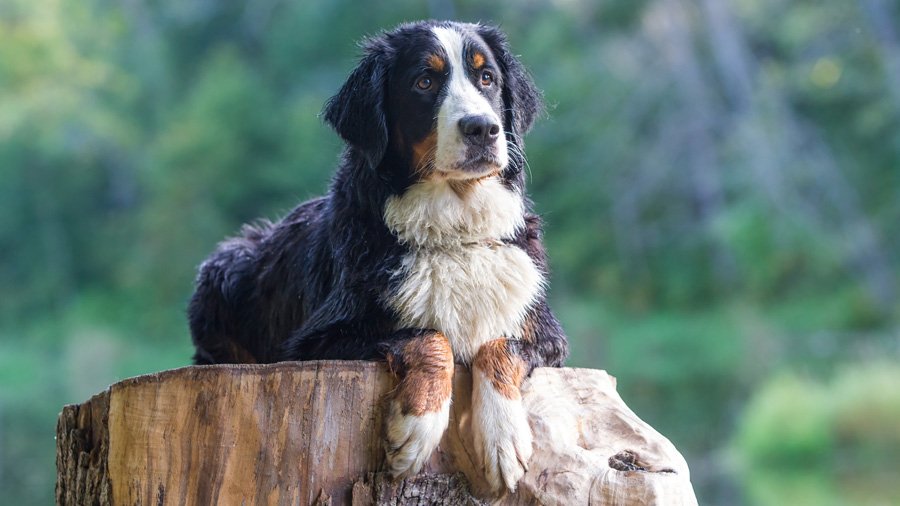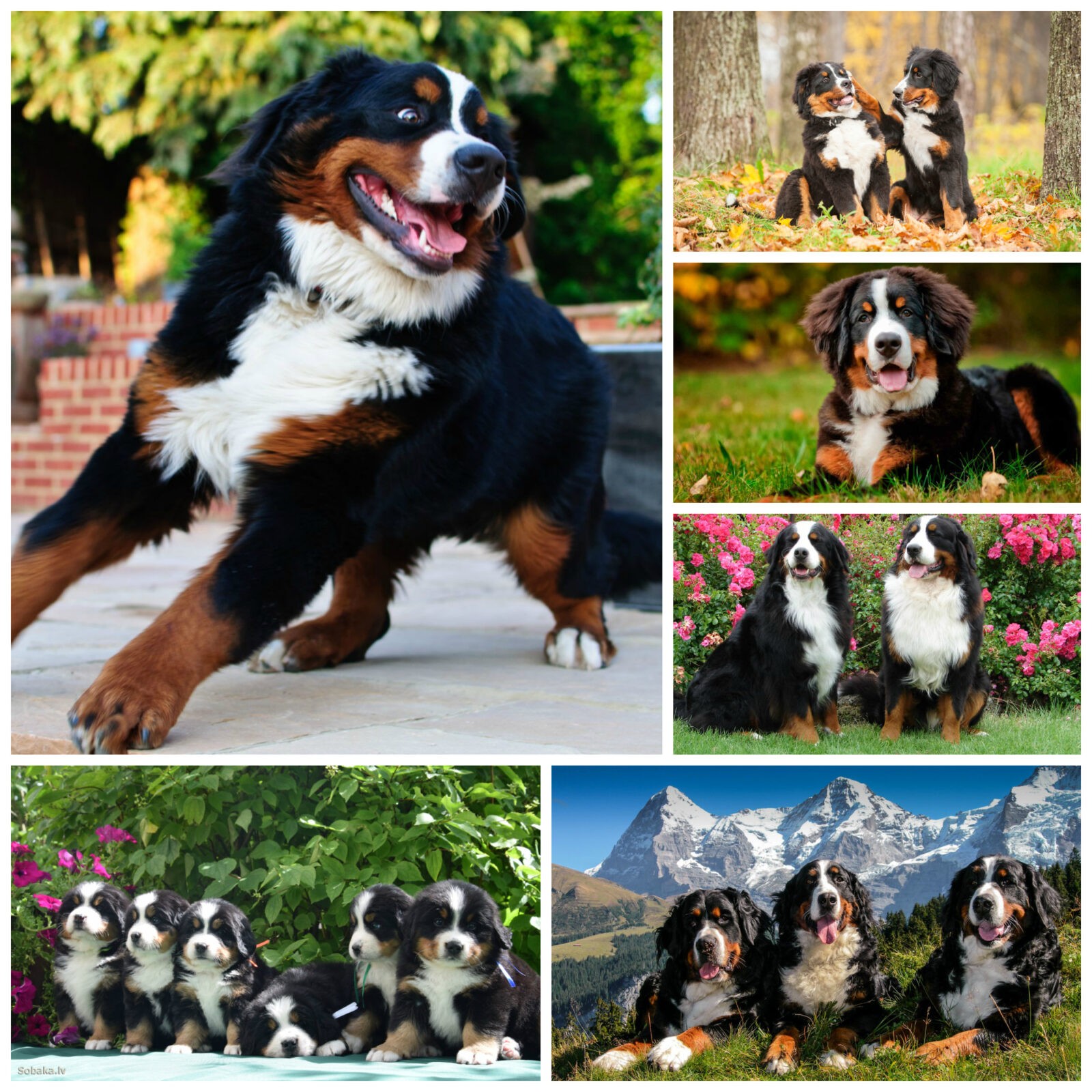
Brief description of the breed Bernese Mountain Dog
The Bernese Mountain Dog was bred in the canton of Bern, and the name of the breed is associated with this. This dog is one of the four species of Mountain Dog, which differs from the rest with its long hair, which is not found in other species. Representatives of this breed have a strong body, they are friendly and calm. Somehow these dogs resemble exteriors.
The Bernese Mountain Dog is famous for its beautiful long and curly hair. Few can resist petting this amazing dog. Most often, dogs of this breed are tricolor. The main color of the coat is usually black with red patches around the eyes and on the tail, as well as white spots between the eyes, on the chest and on the tip of the tail. The mark on the chest sometimes resembles an inverted Swiss cross.
The Bernese Mountain Dog is affectionately referred to as the Berner. This dog is quite difficult to confuse with any other breed due to the tricolor color and a kind of Swiss cross on the chest. Under the beautiful coat is a physically strong dog, created specifically for physical exertion. Traditionally they were bred by Swiss shepherds.
It was once difficult to imagine a Swiss farm without a Bernese Mountain Dog. They were indispensable helpers in grazing and driving livestock, protecting their families, dragging carts loaded with various goods, which were sold in nearby villages.
Although dogs of this breed - real hard workers, distinguished by an excellent character, they almost died out at the beginning of the twentieth century. And all because other means of transportation have become available to farmers. Fortunately, there were already fans of this dogs, thanks to which it was possible to preserve the breed.
A real addition to the outward beauty of the Bernese Mountain Dog is its beautiful character. These dogs loyal, affectionate, sympathetic and very intelligent. They are easy to train, but for this the pet needs time to analyze what is required of him.
The excessive sociability of the Bernese Mountain Dog gives the impression of a certain stupidity, in fact, the dog is very smart. The pet gets along well with children of all ages, and, of course, with all adults. But for those who live in apartments or for those who do not have a large fenced yard, this dog will not work. Bernese Mountain Dogs must frolic in spacious grounds and stay with their family. Since the Bernese Mountain Dog was bred to become a working dog, the animal is endowed with excellent qualities such as a willingness to learn.
Despite the fact that the Bernese Mountain Dog belongs to large dog breeds (average weight is more than 50 kilograms), he does not need early socialization. First you need to train. The fact is that dogs of this breed develop very slowly, both physically and psychologically. During the first years of life, the Bernese Mountain Dog will remain a real child at heart. It should also be remembered that these animals are very vulnerable, it is necessary to treat them kindly, and you should completely forget about the harsh educational moments.
Despite its wonderful temperament and beauty, and perhaps because of it, the Bernese Mountain Dog is now under threat of extinction. The gene pool of this breed is very scarce today. This, in turn, leads to various health problems in this breed. Most often this is due to disorderly, ill-conceived crossing. Those who decide to purchase a Bernese Mountain Dog should be very scrupulous about the purchase and purchase a puppy only from a trusted breeder.
basic information
| Breed name: | Bernese mountain dog |
| Country of origin: | Switzerland |
| The time of the birth of the breed: | many centuries ago |
| Type of: | mountain and swiss cattle |
| The weight: | 36 - 50 kg |
| Height (height at the withers): | 58 - 70 cm |
| Life Expectancy: | 7 - 10 years old |
|
ICF classification:
|
Group 2, Section 3, Number 45 |
| Puppies price: | 250 – 1150 $ |
| Most popular nicknames: | a list of nicknames for the Bernese Mountain Dog |
Assessment of the characteristics of the breed Bernese Mountain Dog
| Adaptability
(a definition meaning how easily a dog can adapt to changes in life) |
🐶🐶🐶 |
| Shedding level
(Level and frequency of hair loss in the animal) |
🐶🐶🐶🐶 |
| Tenderness level
(The level and amount of tenderness and affection that the dog gives in return for attention to itself) |
🐶🐶🐶 |
| Exercise needs
(Dog's daytime activity level) |
🐶🐶🐶 |
| Social need
(The required number of contacts of the dog with other animals, as well as people) |
🐶🐶🐶 |
| Apartment content
(A factor that determines the level of noise and other inconveniences that a dog can deliver to owners in relation to the size of the apartment to the size of the dog) |
🐶🐶 |
| Grooming
(The number of bathing, brushing, and the number of professional grooming sessions required for the dog) |
🐶🐶🐶 |
| Friendliness in an unfamiliar environment
(Features of the behavior of a dog in a society with strangers or in an unfamiliar environment) |
🐶🐶🐶 |
| Tendency to bark
(Tendency to bark and its frequency and volume) |
🐶🐶🐶 |
| Health issues
(Potential health status of the dog) |
🐶🐶🐶🐶🐶 |
| Territoriality
(The dog's tendency to protect his home, yard, or even his owner's car) |
🐶🐶🐶🐶🐶 |
| Friendliness to cats
(The tendency towards tolerance for cats and decreased manifestation of hunting instincts) |
🐶🐶🐶 |
| Intelligence
(The ability of the dog to think and solve emerging difficulties (not to be confused with learning!) |
🐶🐶🐶 |
| Education and training
(The level of difficulty in training the dog to perform certain actions) |
🐶🐶🐶 |
| Friendliness to children
(A factor that determines how friendly a dog is to children, whether he likes to play with them and tolerate some childish pranks) |
🐶🐶🐶 |
| Game activity
(The concept is determined by its very name, and, as a rule, is found in almost all dogs) |
🐶🐶🐶 |
| Observation
(The ability of a dog to detect the presence of a stranger on its territory) |
🐶🐶🐶🐶🐶 |
| Friendliness to other dogs
(The tendency of the dog to find common language with his other relatives) |
🐶 |
Bernese Mountain Dog photo:

Origin story Bernese Mountain Dog
The Bernese Mountain Dog is native to Switzerland. He is one of four representatives of the tricolor Swiss mountain dog, which includes the following breeds: Appenzeller, Bernese Mountain Dog, Entlebuch Mountain Dog and Greater Swiss Mountain Dog. The long coat of the Bernese Mountain Dog distinguishes it from its other close relatives.
The breed was bred directly for work on the farm. Many believe that it appeared many centuries ago as a result of crossing with a mastiff. Before becoming popular, these dogs regularly performed their duties on farms located in the green valleys of the Swiss Alps.
One of the main tasks of dogs of this breed was considered to be the transportation of fresh milk, cheese and other products. Dogs were especially popular with small farmers who were too poor and did not have the money to buy horses for transporting goods.
Until the end of the 19th century, this breed was forgotten. First of all, due to the lack of established breeding efforts. The breed has been forgotten by everyone, but not by the inhabitants of the Bernese region of Switzerland.
A Swiss innkeeper began to breed this breed in 1862. Shortly thereafter, a professor at a University of Zurich rode through the countryside in search of a good dog, a representative breed. After a long search, he managed to find such a dog. From that moment, the process of purposeful restoration of the breed began.
In Switzerland, the first Bernese Mountain Dog club was organized in 1907. From this period, the breed ceased to be just a working one, and took a new position among companion dogs.
Bernese Mountain Dog character
Maintenance and care
The Bernese Mountain Dog is prone to year-round molting, which can increase from season to season. It is necessary to comb the coat at least once a week, and in spring and autumn - more often. This will help to keep the hair tidy and prevent (although it will not completely disappear) the fur from spreading around the house. Depending on the activity of the animal and its cleanliness, there will be a need for bathing. On average, dogs of this breed are bathed about once every two months.
Bacteria can grow actively in the ears of the Bernese Mountain Dog. Ears should be checked weekly for inflammation, irritation, and impurities. The auricles and canals are treated with a special solution prescribed by a veterinarian. Teeth cleaning is also a mandatory weekly procedure. It will keep your dog breath fresh and prevent tartar build-up. Since the Bernese Mountain Dog is very active, its owner will not have to trim its claws often. This should be done only if necessary.
Training and education
Health and disease Bernese Mountain Dog
Some interesting facts
- Bernese Mountain Dogs are prone to numerous health problems due to their small gene pool. Currently, the average life span of dogs of this breed is relatively short: 7-10 years.
- Due to the popularity of this breed of dogs, some breeders breed puppies without adhering to the rules of selection. This has a detrimental effect on the pet's health. You need to be especially careful when importing dogs from abroad. Often these puppies have various diseases.
- Dogs of this breed are prone to active molting, especially in spring and autumn. If you hate moulting, the Bernese Mountain Dog is not for you.
- The Bernese Mountain Dog is very attached to the family. Long stay alone can negatively affect the psychological state of the animal: it can start howling, barking, digging holes, gnawing on various household items, etc.
- Although these dogs are very affectionate with children, due to their size, they can inadvertently harm the child.
Nurseries and breeders
We borrowed material from the wonderful site of our partners DOGCATFAN.COM about cats and dogs, the author dogcatfan

